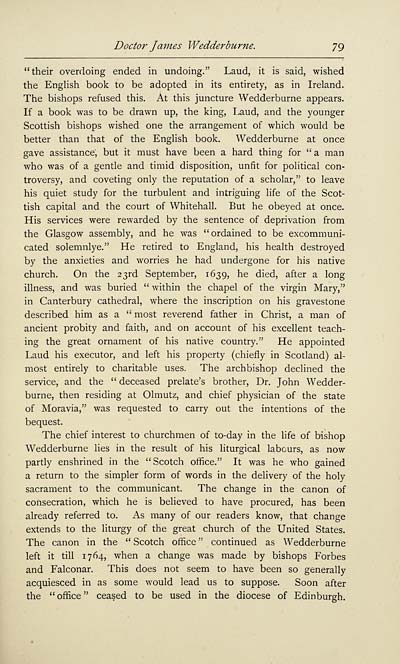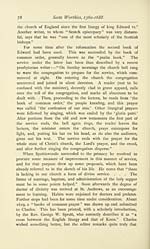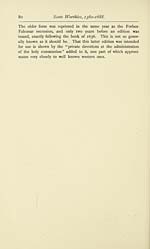Scots worthies, 1560-1688
(99) Page 79
Download files
Complete book:
Individual page:
Thumbnail gallery: Grid view | List view

Doctor James Wedderburne. 79
"their overdoing ended in undoing." Laud, it is said, wished
the English book to be adopted in its entirety, as in Ireland.
The bishops refused this. At this juncture Wedderburne appears.
If a book was to be drawn up, the king, Laud, and the younger
Scottish bishops wished one the arrangement of which would be
better than that of the English book. Wedderburne at once
gave assistance, but it must have been a hard thing for " a man
who was of a gentle and timid disposition, unfit for political con-
troversy, and coveting only the reputation of a scholar," to leave
his quiet study for the turbulent and intriguing life of the Scot-
tish capital and the court of Whitehall. But he obeyed at once.
His services were rewarded by the sentence of deprivation from
the Glasgow assembly, and he was "ordained to be excommuni-
cated solemnlye." He retired to England, his health destroyed
by the anxieties and worries he had undergone for his native
church. On the 23rd September, 1639, he died, after a long
illness, and was buried " within the chapel of the virgin Mary,"
in Canterbury cathedral, where the inscription on his gravestone
described him as a " most reverend father in Christ, a man of
ancient probity and faith, and on account of his excellent teach-
ing the great ornament of his native country." He appointed
Laud his executor, and left his property (chiefly in Scotland) al-
most entirely to charitable uses. The archbishop declined the
service, and the " deceased prelate's brother, Dr. John Wedder-
burne, then residing at Olmutz, and chief physician of the state
of Moravia," was requested to carry out the intentions of the
bequest.
The chief interest to churchmen of to-day in the life of bishop
Wedderburne lies in the result of his liturgical labours, as now
partly enshrined in the "Scotch office." It was he who gained
a return to the simpler form of words in the delivery of the holy
sacrament to the communicant. The change in the canon of
consecration, which he is believed to have procured, has been
already referred to. As many of our readers know, that change
extends to the liturgy of the great church of the United States.
The canon in the " Scotch office " continued as Wedderburne
left it till 1764, when a change was made by bishops Forbes
and Falconar. This does not seem to have been so generally
acquiesced in as some would lead us to suppose. Soon after
the " office " ceased to be used in the diocese of Edinburgh.
"their overdoing ended in undoing." Laud, it is said, wished
the English book to be adopted in its entirety, as in Ireland.
The bishops refused this. At this juncture Wedderburne appears.
If a book was to be drawn up, the king, Laud, and the younger
Scottish bishops wished one the arrangement of which would be
better than that of the English book. Wedderburne at once
gave assistance, but it must have been a hard thing for " a man
who was of a gentle and timid disposition, unfit for political con-
troversy, and coveting only the reputation of a scholar," to leave
his quiet study for the turbulent and intriguing life of the Scot-
tish capital and the court of Whitehall. But he obeyed at once.
His services were rewarded by the sentence of deprivation from
the Glasgow assembly, and he was "ordained to be excommuni-
cated solemnlye." He retired to England, his health destroyed
by the anxieties and worries he had undergone for his native
church. On the 23rd September, 1639, he died, after a long
illness, and was buried " within the chapel of the virgin Mary,"
in Canterbury cathedral, where the inscription on his gravestone
described him as a " most reverend father in Christ, a man of
ancient probity and faith, and on account of his excellent teach-
ing the great ornament of his native country." He appointed
Laud his executor, and left his property (chiefly in Scotland) al-
most entirely to charitable uses. The archbishop declined the
service, and the " deceased prelate's brother, Dr. John Wedder-
burne, then residing at Olmutz, and chief physician of the state
of Moravia," was requested to carry out the intentions of the
bequest.
The chief interest to churchmen of to-day in the life of bishop
Wedderburne lies in the result of his liturgical labours, as now
partly enshrined in the "Scotch office." It was he who gained
a return to the simpler form of words in the delivery of the holy
sacrament to the communicant. The change in the canon of
consecration, which he is believed to have procured, has been
already referred to. As many of our readers know, that change
extends to the liturgy of the great church of the United States.
The canon in the " Scotch office " continued as Wedderburne
left it till 1764, when a change was made by bishops Forbes
and Falconar. This does not seem to have been so generally
acquiesced in as some would lead us to suppose. Soon after
the " office " ceased to be used in the diocese of Edinburgh.
Set display mode to:
![]() Universal Viewer |
Universal Viewer | ![]() Mirador |
Large image | Transcription
Mirador |
Large image | Transcription
Images and transcriptions on this page, including medium image downloads, may be used under the Creative Commons Attribution 4.0 International Licence unless otherwise stated. ![]()
| Histories of Scottish families > Scots worthies, 1560-1688 > (99) Page 79 |
|---|
| Permanent URL | https://digital.nls.uk/95152214 |
|---|
| Description | A selection of almost 400 printed items relating to the history of Scottish families, mostly dating from the 19th and early 20th centuries. Includes memoirs, genealogies and clan histories, with a few produced by emigrant families. The earliest family history goes back to AD 916. |
|---|

